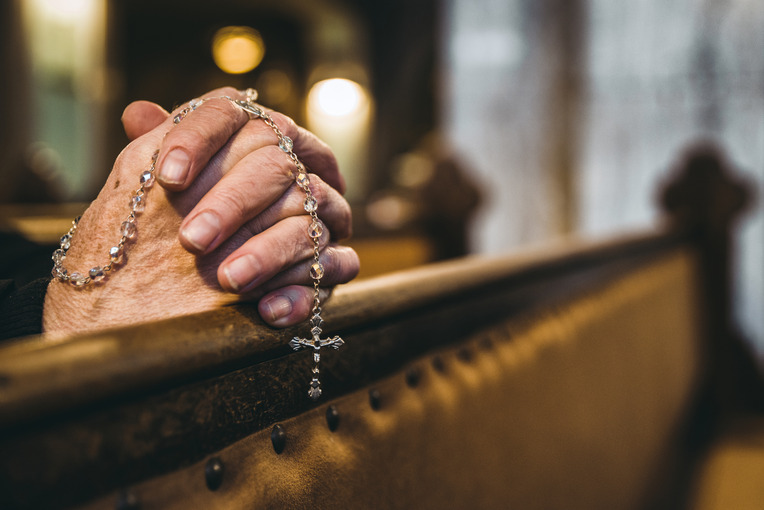In his August 18 article for America Magazine, Fr. Matt Malone boldly states, “Christianity is not a self-help group!” He uses the life and conversion of St. Ignatius Loyola to remind us that conversion to Christianity is a process that takes place over a period of time, with the many advances and setbacks that are so familiar to us personally. After working to be a Christian through modeling himself after the saints, Ignatius is distraught and near suicide, and he tells God: “I give up. I have done all I can. I have tried everything. I’m handing it over to you, to do with it what you will.” Fr. Malone says: “There is a big lesson in that: We are not in ultimate control of our faith journeys, any more than we control our ultimate destinies. It’s true that we have to put in the time and effort – God can do little for us if we are unwilling to cooperate. But Christianity is not a self-help group; it’s a God-help group.”
“And let the peace of Christ control your hearts, the peace into which you were also called in one body.
And be thankful. Let the word of Christ dwell in you richly, as in all wisdom you teach and admonish one another, singing psalms, hymns, and spiritual songs with gratitude in your hearts to God.
And whatever you do, in word or in deed, do everything in the name of the Lord Jesus, giving thanks to God the Father through him.” Col 3:15-17
We must surrender
Wow. This simple statement is a blindingly powerful reminder to us both for our personal journey and our expectation of others. Michael D. O’Brien suggests that as we have moved out of a Christendom age, we have also moved away from our call to the common good and interconnectedness. We desire to be “autonomous units in control of ourselves. We want salvation, the consolation of God – but on our own terms.” By operating in the realm of “self,” we can forget that Christianity is not a self-help group.
Zing. I know that I fall into that description. I want the salvation I want on my terms. How easy it is to identify with the young man who was saddened and walked away when he was asked to give everything up and follow Jesus! This is also something that seems to be happening in parish communities. Not only do people want the Mass and even the church property to adhere to a certain expectation, we also apply that to each other and to visitors. So while we are focused on our own expectations, we may be excluding others who need our care.
The result is that our parishes become unwelcoming. Our groups become clubs that maintain a grip on their unchanging view of the group. While holding tightly to our current process and views, we insulate ourselves out of existence. The lesson of Ignatius is that on a personal and community level, we must surrender to Christ. We are not in control.
Caring for each other
In “From Christendom to Apostolic Mission,” Msgr. Shea describes a person’s daily experience in an Apostolic Age is that the world is spiritually and morally different from them. It is a time where lay witness and evangelization emerges as an important catalyst for faith. Our current apostolic time also seems to parallel the world Etienne Gilson wrote about in his 1949 Essay “Terrors of the Year 2000”. Gilson wrote: “Since men have refused to serve God, there is no longer an arbiter between them and the State which dominates them. It is no longer God but the State which judges them. But who, then, will judge the state?”
These two points of view remind us that we must constantly listen for Christ. For me, it means more prayer and meditation. So that as we each strive to live our Faith and tell the Good News by example and invitation, we do it with and through Christ and not through our “self.”
I was reflecting on the Bishops’ Pastoral Letter for Stewardship recently. The letter is organized in sections starting with our call to discipleship, Jesus’ life as the ideal model, living as a Christian steward, and the broader role of stewards as part of the Church. The bishops call for us to live in collaboration with God in the “work of creation” and cooperation in the “work of redemption.” We are explicitly called to care for one another and for our environment and are reminded that the Church is a community.
Conclusion:
Does this not seem like a time when people have moved away from the common good and interconnectedness and are operating from a desire to be autonomous? Fr. Malone offers us the answer: Christianity is a God-help group. He references St. Paul’s letter to the Colossians: “Put to death, then, the parts of you that are earthly. Stop lying to each other, since you have taken off the old self with its practices and put on the new self, which is being renewed, for knowledge, in the image of its creator.”
For more ideas, please visit the Church Growth blogs on the ACS Technologies site.
Terry Poplava is a multi-disciplined executive with extensive sales, product marketing, strategy and leadership experience in supporting faith organizations. Terry’s professional experience includes organizational leadership, corporate development and growth, consulting with and training church leaders, and leading strategic and priority planning for churches and dioceses. He currently serves on the advisory board for the National Shrine of Our Lady of La Leche in St. Augustine FL, as cantor at St. Andrew parish in Myrtle Beach, SC. and recently as Chairman of the Finance Council at St. Mary the Virgin Mother parish in Hartsville, SC.




